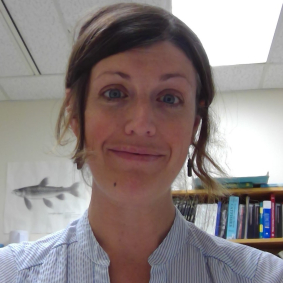Elsa Goerig
Postdoctoral research fellow, Museum of Comparative Zoology, Harvard University, Cambridge, Massachusetts
PhD, Earth sciences, 2017
“My time at INRS has allowed me to acquire different skills, all of which are complementary to each other.”
Since receiving her PhD in Earth sciences from the Centrer Eau Terre Environnement in 2017, Elsa Goerig has been studying the behaviour, biomechanics and swimming performance of various fish species at the Museum of Comparative Zoology at Harvard University. She is also affiliated with the US Geological Survey’s S.O. Conte Anadromous Fish Research Center, where she conducts research on the locomotion of migratory species and their ability to cross river barriers—such as fishways and culverts—using advanced telemetry and statistical techniques. Her work focuses on species such as Atlantic salmon, sturgeon, eel, sea lamprey and Asian carp.
Her graduate studies at INRS provided Elsa with advanced training in both theory and practice under the direction of Professor Normand Bergeron. Elsa particularly appreciated the autonomy and freedom her research director gave her. She was thus able to orchestrate her family life and her doctorate, which involved a lot of fieldwork, with great success. “I had just had my first child when I accepted a master’s project at INRS. My professor didn't mind. I always felt supported. He was very understanding and together we were able to find solutions to reconcile my research work with my family responsibilities. In the end, I had two more children before I finished my doctorate! she says with a laugh. “My time at INRS allowed me to acquire different skills, all of which complement each other. Also, my various student commitments and my participation in international training and conferences have helped me develop my leadership skills as well as several cross-cutting skills that are useful in my work.” She adds, “These opportunities to be involved in different student committees at INRS and in other research groups, allow me to develop other essential professional skills, such as networking and project management.”
Elsa emphasises that when choosing a master’s or a doctoral project, it is important to choose a subject that one is passionate about in the first place. Graduate studies are indeed a long process, hence the importance of having a strong interest in one’s research topic. Despite this, many students encounter difficulties in their journey. Elsa would like to see more services offered to students in order to better support them in their academic journey. A lot of progress has been made in recognising the importance of students’ physical and mental health, but she would like to see more of it and in a more formal way.
“Throughout my studies, I have seen students drop out, some even at the end of their courses. There are different reasons why a student might drop out: exhaustion, lack of support or money, or even the desire to start a family. I myself needed support at one point and it was an INRS employee who was able to help me informally. I strongly encourage anyone who feels the need to seek help. Do whatever it takes to make your life easier. The work is worth it!”
Interviewed in August 2022

